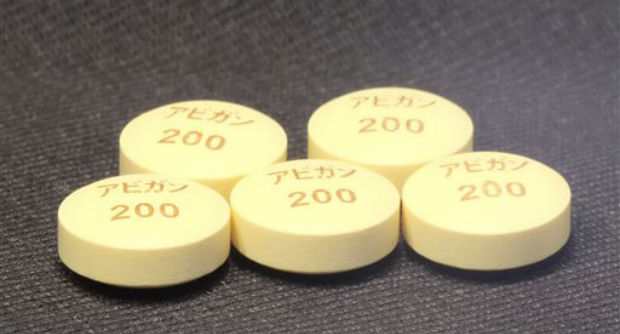Japan ready to offer flu drug for Ebola treatment
TOKYO—Japan said Monday it is ready to provide a Japanese-developed anti-influenza drug as a possible treatment for the rapidly expanding Ebola outbreak.
Chief Cabinet Secretary Yoshihide Suga told reporters that Japan can offer favipiravir, developed by a subsidiary of Fujifilm Holdings Corp., at any time at the request of the World Health Organization.
The drug, with the brand name Avigan, was developed by Fujifilm subsidiary Toyama Chemical Co. to treat new and re-emerging influenza viruses, and has not been proven to be effective against Ebola.
Favipiravir was approved by Japan’s health ministry in March for use against influenza. Fujifilm is in talks with the U.S. Food and Drug Administration, through a U.S. partner, Medivector, to prepare for clinical testing of the drug in treating Ebola, company spokesman Takao Aoki said.
He said Ebola and influenza viruses are the same general type, and a similar response can theoretically be expected from Ebola.
Article continues after this advertisementFavipiravir inhibits viral gene replication within infected cells to prevent propagation, while other anti-viral drugs often are designed to inhibit the release of new viral particles to prevent the spread of infection, the company said.
Article continues after this advertisementThe company has enough stock of favipiravir for more than 20,000 patients, Aoki said.
Suga, the Cabinet spokesman, said Japan is watching for a decision by WHO that would provide more details on the use of untested drugs against Ebola. In case of an emergency, Japan may respond to individual requests before any further decision by WHO, he said.
WHO said earlier this month that it is ethical to use untested drugs on Ebola patients given the magnitude of the outbreak.
Several drugs are being developed for the treatment of Ebola. They are still in the early stages and there is no proven treatment or vaccine for the often fatal disease.
Recently, two American doctors recovered from Ebola after being treated with the experimental drug ZMapp, though it was unclear whether they were cured by the drug.
However, a Liberian doctor who was among three Africans to receive ZMapp recently died, the country’s information minister said Monday.
Only six people in the world are known to have received ZMapp. The small supply is now said to be exhausted, and it is expected to be months before more can be produced by its U.S. maker, Mapp Biopharmaceutical Inc.
ZMapp had never been tested on humans, although an early version worked in some Ebola-infected monkeys. It is aimed at boosting the immune system’s efforts to fight off Ebola.
Asked about the drug being offered from Japan, Liberian Information Minister Lewis Brown said, “Although we will continue to emphasize prevention, we remain open to all available curative opportunities.”
Ebola has killed more than 1,400 people in West Africa in the latest outbreak.
